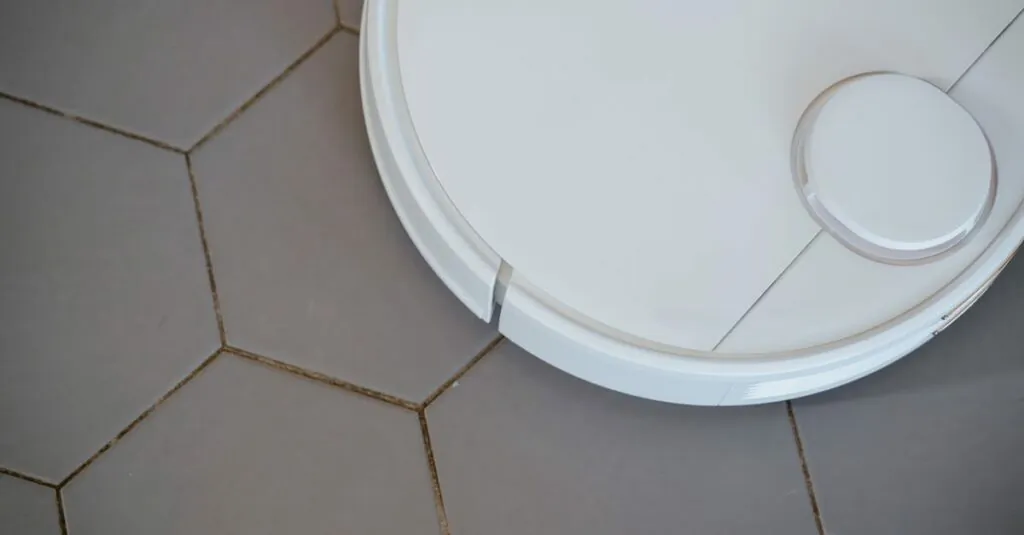Table of Contents
ToggleImagine walking into your home and having it greet you like a loyal butler. With smart tech home appliances, this isn’t just a dream—it’s reality. These gadgets don’t just make life easier; they practically run the household while you kick back and binge your favorite show. From refrigerators that remind you when you’re out of milk to washing machines that can be controlled from your phone, smart appliances are the new household heroes.
Gone are the days of wrestling with outdated gadgets that seem to have a personal vendetta against efficiency. Embracing smart tech means embracing a lifestyle where convenience meets innovation. So why not let your home do the heavy lifting? Dive into the world of smart appliances, and discover how they can transform your space into a futuristic haven, all while keeping your sense of humor intact. After all, who wouldn’t want a fridge that can crack jokes while keeping their leftovers fresh?
Overview of Smart Tech Home Appliances
Smart tech home appliances offer significant advancements in convenience, efficiency, and connectivity. These devices automate and streamline various household tasks, allowing users to manage their homes seamlessly. For instance, smart refrigerators track inventory and suggest recipes based on available ingredients.
Adopting smart washing machines enables individuals to monitor cycle progress remotely via smartphone apps. Smart ovens can preheat based on user preferences while sending alerts when meals are ready.
Voice-controlled systems integrate seamlessly with these appliances, enhancing usability through simple commands. Smart home ecosystems, like Amazon Alexa and Google Assistant, coordinate appliance functions effortlessly.
Energy efficiency also benefits from smart technology. Many data-driven appliances optimize usage patterns to reduce energy consumption, leading to lower utility bills. Smart thermostats learn user behavior over time and adjust heating and cooling automatically.
Securing homes has transformed through smart tech as well. Devices such as smart locks and security cameras provide real-time monitoring and control from anywhere. Integration with other smart appliances creates a comprehensive home system that prioritizes convenience and safety.
Overall, smart tech home appliances enhance daily living, transforming conventional routines into modern experiences. As homeowners increasingly embrace these technologies, the potential for innovative living spaces continues to grow.
Benefits of Smart Tech Home Appliances
Smart tech home appliances provide notable advantages that enhance modern living. Their integration into daily life leads to substantial improvements in convenience and efficiency.
Convenience and Automation
Enhanced automation streamlines daily routines. Smart appliances offer features like remote monitoring and control, making chores simpler. From washing machines that operate on schedules to refrigerators that suggest recipes based on available ingredients, automation saves time. Voice-activated controls let users manage multiple devices without moving. Such features lead to a smoother household experience. Homeowners benefit from increased leisure time as smart appliances take care of routine tasks.
Energy Efficiency
Energy-efficient technology significantly reduces utility bills. Smart appliances often analyze usage patterns to optimize energy consumption. For instance, smart thermostats learn preferences and adjust heating and cooling accordingly. Additionally, appliances like dishwashers delay operation during peak hours to lower energy costs. This optimization not only saves money but also minimizes environmental impact. Homeowners enjoy peace of mind knowing their appliances are working efficiently, contributing to sustainable living.
Popular Types of Smart Tech Home Appliances
Smart tech home appliances have revolutionized household management. These devices provide enhanced functionality and convenience, making daily routines easier.
Smart Refrigerators
Smart refrigerators track food inventory and notify users when items are running low. They suggest recipes based on available ingredients, promoting more efficient meal planning. Some models feature touchscreen displays that allow users to create shopping lists and view calendars. These appliances also connect to smartphone apps, enabling remote management and alerts about temperature changes.
Smart Washers and Dryers
Smart washers and dryers offer features that optimize laundry routines. Users can start washes or adjust settings from their smartphones, eliminating the need to be physically present. Many models include sensors that detect fabric types and load sizes, automatically adjusting wash cycles. Additionally, these appliances provide notifications when cycles are complete, ensuring laundry doesn’t get forgotten.
Smart Thermostats
Smart thermostats enhance energy efficiency in homes. These devices learn user preferences and adjust heating or cooling accordingly. Remote access through apps allows users to modify settings from anywhere, ensuring comfort upon arrival. Many models analyze energy usage patterns and provide tips on saving costs, effectively reducing utility bills and environmental impact.
Integration with Smart Home Systems
Smart home systems provide seamless connectivity between appliances, enhancing user experience. Integration allows appliances like smart refrigerators and washing machines to communicate with each other. This interoperability simplifies tasks and streamlines daily routines.
Compatibility with voice assistants significantly boosts functionality. Users can adjust settings or consult appliances through simple voice commands. For instance, asking a smart oven to preheat while preparing ingredients saves valuable time.
Security features also benefit from smart appliance integration. Smart locks and cameras can alert homeowners when unexpected activity occurs. Users receive notifications on their smartphones, offering peace of mind while away from home.
Home automation enhances energy management. Smart thermostats adjust heating and cooling based on user behavior, optimizing energy consumption. Appliances such as dishwashers can schedule runs during off-peak hours, reducing electricity costs.
Data sharing among devices creates a more efficient environment. Smart refrigerators track food inventory and connect with meal planning apps. Using these insights, users can receive personalized recipe suggestions based on available ingredients.
Integration fosters a more connected lifestyle. It enables homeowners to monitor and control appliances remotely, ensuring convenience and efficiency. With a single smartphone app, users manage multiple devices, from washing machines to lighting systems.
Sustainability becomes easier through smart home systems. Many appliances provide feedback on energy usage, allowing homeowners to make informed decisions. Adopting these technologies promotes eco-friendly habits and reduces utility bills.
Challenges and Considerations
Smart tech home appliances offer many advantages, yet they present specific challenges and considerations. Understanding these factors is crucial for informed decision-making.
Security Concerns
Security represents a significant challenge with smart home appliances. Many devices connect to the internet, making them susceptible to hacking and cyber threats. Data breaches can expose personal information, leading to identity theft or unauthorized access. Manufacturers must prioritize security features in their devices. Encryption protocols and regular software updates enhance protection against cyberattacks. Homeowners should utilize strong passwords and two-factor authentication to fortify their devices. Regular monitoring of device activity can also help detect unusual behavior early.
Compatibility Issues
Compatibility poses another challenge for smart home appliance users. Devices from different manufacturers may not always interact seamlessly, leading to frustration during setup or operation. Standards vary across brands, which complicates the integration of appliances into a cohesive system. Homeowners should research product compatibility before purchasing. Checking compatibility with existing smart home ecosystems is vital. Solutions like hubs can bridge gaps between devices, simplifying communication. Focusing on interoperable devices ensures a smoother user experience and enhances the overall functionality of a smart home setup.
Smart tech home appliances are revolutionizing how households operate. By integrating these innovative devices into daily routines, homeowners can enjoy enhanced convenience and efficiency. The ability to automate tasks and monitor appliances remotely not only saves time but also promotes energy savings.
However, it’s crucial for users to remain vigilant about security and compatibility issues. By prioritizing secure practices and researching product compatibility, they can fully harness the benefits of smart technology. As the market continues to evolve, embracing these advancements will lead to a more connected and sustainable living environment. The future of home management is here, and it’s smarter than ever.







